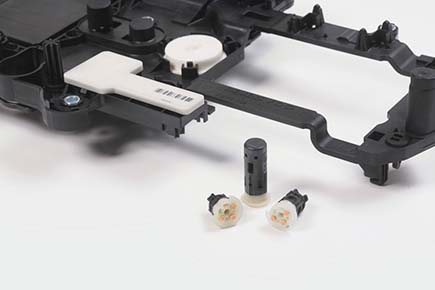Laser Welding Automotive Sensors
Use of plastics to increase yields, reduce warranty costs,
and increase the reliability of sensor packages

The use of thermoplastics in automotive sensors and electronics modules is growing . . .
. . . as automotive design engineers look for ways to enhance safety, increase fuel efficiencies and reduce emissions, Laser plastic welding is the perfect assembly technique for sensor packages by contributing to weight savings, reduced bill of materials, stronger bonds, and reduced assembly times. Laser plastic welding is used to seal covers on plastic electronics enclosures and in subassemblies integrated into safety, fuel, engine control, and navigation systems.
Welding of Engineering Polymers
Laser plastic welding can weld any thermoplastic polymer, including up to 30% glass filled nylons; PA-6, PA-66, PBT, PET, PC, PBT/ABS alloys, and many others.
Major Benefits of Laser Plastic Welding to Assembly of Plastic Automotive Sensors
Laser plastic welding offers a high degree of flexibility to rapidly and inexpensively change over to new designs and adapt to new product form factors by simply changing the tooling and uploading the latest CAD designs into the machine.
Laser plastic welding machines are available in the right size to fit your needs with machines to accommodate part sizes from 100 mm x 100 mm to 1,000 mm x 750 mm.
Key Advantages for Laser Welding of Plastic Fluid Components
Particle Free
Laser plastic welding is a particle-free joining process compared to ultrasonic or vibration welding so your assembly process will not contribute to particulate contamination from the manufacturing process.
Protect Sensitive Electronics and Sensors
Exceedingly Strong
The dynamic process of quasi-simultaneous welding supplies additional material to the joint, much like a welding rod in metal welding, to create joints that exceed the strength of the molded parts themselves.
Significant Savings on BOM and Labor
The laser plastic welding assembly method allows designs without the need for screws that reduces the bill of materials (BOM) and therefore costs compared to components that are secured with screws. Laser plastic welding is a faster assembly method compared to UV cured adhesives and eliminates the costly maintenance and mess of glue dispensing and curing.
Fast Cycle Times
Depending on the part size, laser plastic welding machines from LPKF has cycle time from a few seconds on small parts (100 mm x 100 mm) to under a minute for large parts (500 x 350 mm).
Laser Welding Machine Configurations
Off the Shelf Solutions
LPKF has a wide range of highly flexible, standardized machines with custom tooling to rapidly change from one part to another with a simple CAD import and quick-change tooling. Laser welding machines come in four different standard sizes to match your part size and budget. LPKF has a complete line of standalone and integrated laser plastic welding solutions to fit your R&D, development and low to high volume manufacturing requirements.
Custom Solutions
LPKF also offers custom engineered solutions with multiple lasers, mirrored tooling, clamping systems, and conveyor systems to that are turnkey, drop-in solutions.
Manage Risks
LPKF systems are backed by process development, prototyping and validated production recipes so the you don’t have to worry about the details of laser welding. Let LPKF worry about the welding, so you don’t have to. LPKF’s Getting Started program provides you with rapid materials and design evaluation and guidance to manage risk right from the start. For one low price, you can have a customized development package that includes material tests, design evaluations and guidance, prototype tooling and services to deliver proof of concept parts and prototypes in three to four weeks.
Want to Know More about Laser Plastic Welded Automotive Sensors?
Please complete the form below and our experts will contact you to discuss your specific application.
